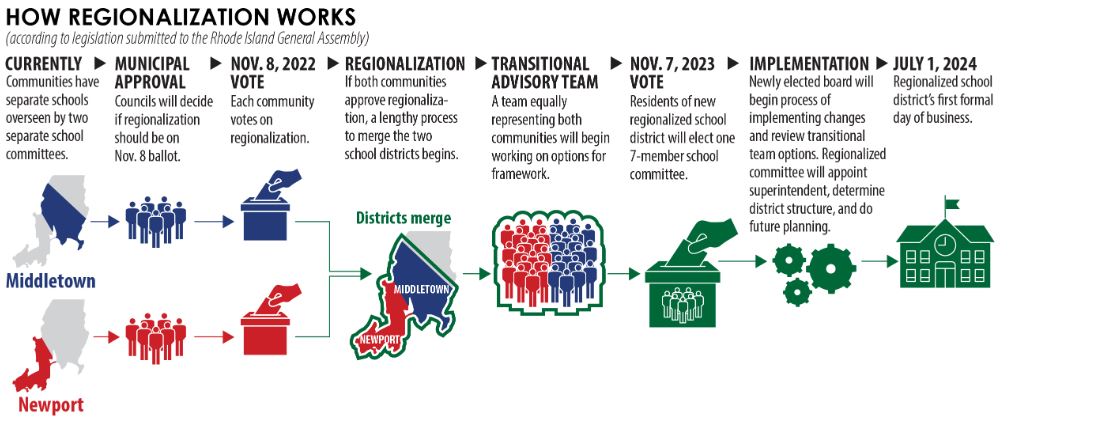
BLOG
—
Rhode Island Towns Discuss Regionalizing School Districts to Improve Funding, Resources
Back in February, two small towns on an island off the coast of Rhode Island began a conversation about combining districts under a process called “regionalization.” If regionalized, the Middletown and Newport school districts would be governed by a single administration and have a combined education committee, central office and staff. This move would enable the districts to share resources and maximize state aid.
We at Woolpert were brought in to help the communities evaluate this process, provide clear data on the pros and cons of regionalization specific to these districts, gain additional information about the wants and needs of the communities, and to help educate the public on this process ahead of the Nov. 8 election. We held our first public meetings in June, held two more yesterday, have another scheduled for today, and will present again on Aug. 22 and 23 to ensure the communities have full visibility to the opportunity and can have all their questions answered.
Benefits of Regionalization
Based on data from other regionalized school districts and evaluations of these districts, the educational and financial benefits of regionalization are clear. By combining resources and amenities, students and staff from pre-kindergarten through high school can have access to more opportunities, equipment, qualified staff and course choices. This includes doubling the career tech and advanced placement (AP) classes that are crucial to future success. The move also enables a cost decrease in administration and operations, while introducing opportunities for increased state funding. Rhode Island incentivizes schools who regionalize by providing money to build new facilities and repair current facilities, provides housing aid for projects already approved by voters and reimburses 50% in district transportation needs.
The money saved through regionalization can be reinvested in the schools to provide new student programs, improve technology and increase teacher salaries, drawing additional talent to the region. This process has been shown to make schools more competitive and retain students throughout the region and state.
In Middletown and Newport, the data and information gathered and discussed will enable the communities to understand the benefits and detractions specific to their wants and needs. Once the decision is made either way, they have the control to determine how to best utilize their resources to the advantage of all involved.
 Challenges to Overcome
Challenges to Overcome
In the last 20 years, the Middletown and Newport school districts have attempted and failed to merge twice, making community members doubt the process. But there was not the access to the data involved or the opportunity to discuss this possibility as comprehensively at that time. Everyone has a fear of change and the unknown, and this would a big change. But change is needed when the pros far outweigh the cons. No one really knows what the education system will look like in 10 years, but increased funding, amenities, resources and opportunities will always be welcomed. It is an investment, but it is an investment in the region’s youth, educational opportunities and economic development.
Giving the Region a Voice
The public meetings we are holding this summer are similar to the process that is used in master planning for educational facilities. They are designed to gain perspectives from all involved, from the school administrations and staffs to parents and students throughout the Middletown and Newport communities. About 80 people from the region attended the June sessions and were able to voice their questions and concerns. The overall feedback was that Middletown and Newport residents want to maximize the opportunities available to their students and want to ensure this plan is financially advantageous.
Tonight's meeting is virtual and set for 6-8 p.m. The agenda will cover questions that surfaced during and after the June discussion, address specific academic and athletic concerns, share case studies on how a Middletown-Newport regionalized school district compares to other districts, outline financial and academic benefits and challenges, and conclude with a round-table talk. We are looking forward to hearing more from these community members and making sure the future holds exactly what they believe is best for them.
For more information about this topic and upcoming sessions, visit middletown-newport.us.

Jessica Goodell
Woolpert Senior Consultant Jessica Goodell, PE, has 15 years of experience in conducting facility condition assessments, forensic investigations, and leading master planning efforts. She has worked with some of the largest school districts in the U.S. and is skilled at not only understanding facilities and equipment but communicating data and report findings for K-12 institutions.


